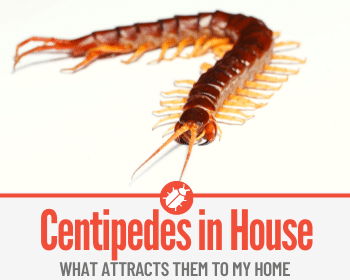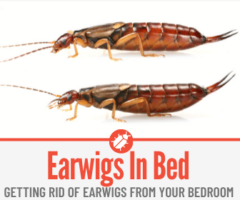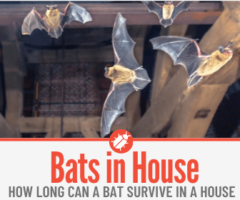 Wondering why are the Creepy Centipedes in your house and what actually attracted them to your house?
Wondering why are the Creepy Centipedes in your house and what actually attracted them to your house?
Not sure how to get rid of the centipedes from your home?
In this guide you will learn:
- Reasons why you might have centipedes in your home,
- How do the Centipedes get in houses & Where do they come from,
- How to Get Rid of Centipedes & keep them away from your house.
Centipedes have multi-sectional bodies with 1 set of legs on each section. They also have a pair of antennae and a claw-like mouth.
Their name ”Centi-pede” or ”thousand-legger” implies that they have one hundred legs or possibly even more, In reality, they have varying amounts of legs (15-170 pairs depending on their length) and grow to be more than 6 and a half inches long.
What Attracts Centipedes to Homes?
Have you found these creepy crawlers in your basement or garage lately?
There are 3 main things to keep in mind when trying to figure out if your home is the perfect place for centipedes to thrive.
These requirements are Moisture, a stable food source, and a good place to stay during the day.
1.Moisture
Any type of moisture, standing puddles, dripping water, or standing water can come from a multitude of different places inside and around the home.
Hoses or Spigots that leak, a particularly shady area after rain, clogging or water accumulation because of gutter problems, or drainage of other water areas, like pools, can all lead to moisture retention in and around the home.
This makes the perfect spot for centipedes to start and ensures that they will have moisture to keep living.
Make sure that you are keeping track of any and all spots that retain moisture, as these can be spots for centipedes to congregate or move towards.
Also, make sure that if you do have any leaks, if you do, get them fixed as soon as you can.
If not, you can unintentionally draw Centipedes to your home. Moist soil around that home can be a great spot for centipedes to burrow into and lay eggs.
Keep anything that can retain moisture from laying right up against your house such as piles of wood, piles of leaves, or any trash. Not only can Centipedes use these as places to stay, these could also be spots of vulnerability used to find ways into your home.
The easiest way to fix this problem is to make sure that the moisture is reduced. This could mean fixing leaks or filling cracks, buying a dehumidifier to take moisture out of the air, keeping tall grass as dry as you can, or hiring a professional to take care of the moisture problem.
2.Food
Centipedes will be found where there is an ample supply of food for them to survive. A centipede will eat insects, bugs, and spiders. Areas where these are in abundance will draw Centipedes to the area.
To avoid attracting bugs at night, make sure that blinds are closed and lights are turned off. The bugs will be attracted to the lights, and the centipedes will be attracted to the bugs.
Keep an eye out for centipedes around plants that you may have outside or inside as many bugs like to hang out around plants drawing the Centipedes to them.
Another thing that may attract bugs is trash that is left outside. Centipedes will be drawn to the large amount of flies and spiders that are in turn drawn to the trash that has been left out.
Anywhere that there is an accumulation of bugs and spiders will have a high chance of having Centipedes as well.
Since Centipedes are not usually seen often, indications of a higher bug population can be a good indicator that there is something else going on as well.
Getting rid of a Centipede’s source of food will force centipedes out of your home to look for food elsewhere.
Annual Bug spraying done by Pest Control can be extremely beneficial in getting rid of bugs and spiders from your home. Without the food source, Centipedes will be less of a problem in your home.
3.A Place to Call Home
Lastly, Centipedes need a place to spend the day that is away from other predators, humans, and sunlight.
Since Centipedes are nocturnal, meaning they are active during the night, centipedes want to be well out of the way and hidden from other animals or humans during the day. This will be true for Centipedes living both inside and outside of your home.
Places where Centipedes stay varies greatly. They may be hiding within piles of wood, or under construction equipment that has been left out for a while.
Centipedes can even hide in tall damp grass or in leaf piles. They may also be around things that are temporary; something that may only be left out for a few days, like toys or the bottoms of kiddie pools.
Indoors, Centipedes will stay under shelves, boxes, or other items. If centipedes can find these within an unused room in your house it’s even better.
Centipedes prefer to live away from predators and humans.
The easiest way to keep Centipedes from having a place to stay in your home is to get rid of things that they would stay in or under.
Keeping your yard picked up will deter other bugs from living around or in your yard and in turn will mean that Centipedes will not be found in your yard either.
Keeping your grass regularly cut will also deter Centipedes from living in tall moist grass and ultimately coming inside your home.
Where do Centipedes Come From & How Do they Get in a House
Centipedes are able to get inside your home through the small cracks or holes on the outside of your home.
Double-check where wiring or piping enters the home, as these can easily have cracks or leaks that Centipedes and other animals can get through.
Make sure to also check on the inside of your home in basements, garages, and attics as you may be able to find a problem inside.
Originally found around the Mediterranean area, centipedes were eventually imported to the Americas and now they are one of the most common Arthropods found in America.
Their Cousin the millipede is also a common arthropod with a segmented body.
Centipedes can lay up to 60 eggs at a time in moist soil or a forgotten pile of moist leaves.
Many of the more common centipedes like the house centipede can live 5-6 years in your house!
To avoid having Centipedes or other animals come into your home, make sure to keep an eye out for cracks and holes, then have them fixed as soon as you can.
Pest control Professionals may be the best option as they can get the job done quickly and correctly.
Having Centipedes in your house may mean that there is a moisture problem, and/or a bug infestation, as these are 2 perfect conditions for centipedes.
Unfortunately, Centipedes don’t leave any kind of trace that they are in a home, so it may be difficult to know that you have a large centipede infestation in the first place.
Centipedes are also more active at night, so they are able to get around mostly out of a human’s way.
This makes it even harder to find them as they will be moving around the most while you are sleeping.
Centipedes are also surprisingly fast and try to avoid any human contact so keep your eyes peeled.
Centipedes in the House – Is it a Problem?
Whether or not it is a problem is completely up to you. There are both positives and negatives to having Centipedes in your home.
When crushed Centipedes can leave some staining behind, especially on carpets, and although extremely rare, centipedes can bite.
They do try to avoid human contact but if they have no other choice they will try to bite.
Centipedes are also venomous, but their venom isn’t dangerous and at most will only cause mild irritation if the jaws break the skin at all.
Their frightening appearance and extremely quick movements may be off putting to some and you may decide not to share your home with them.
On the plus side, centipedes are great ways to get rid of bugs or spiders in your home. This makes centipedes one of the few natural spider eradicators.
Basements, garages, or attic spaces are the perfect spot for Centipedes to hide in as they are usually cool, dark, and damp.
This may also be where a large amount of other bugs or spiders are also found.
If you have large amounts of centipedes in your home you have several options. You can try to catch them yourself using sticky traps and then throwing them away once they have been caught.
This will effectively stop Centipedes from continuing to be in the area that is affected.
However, if the problems of moisture and other bugs are not solved, you may find Centipedes still living in the affected area.
Another option for a large Centipede infestation would be to call pest control professionals.
They will be the best equipped to handle many bugs and potentially multiple other problems that you may have.
The last solution would be to leave them alone.
However, this only works if you have a smaller population of centipedes, and if you are ok with sharing your house with the centipedes for a bit.
Centipedes feast on the other home invaders so many people do see them as a helpful hindrance and tend to leave them alone, at least for a while.
If you are wondering what can Centipedes eat and destroy in your home…
Thankfully Centipedes do not cause any damage to furniture or to the home in general.
Centipedes’ main food source will be bugs and spiders that are found in the home. These other bugs may be found within your house plants or in spaces like garages or basements.
How to Keep Centipedes Away from Your House
Keeping Centipedes out of your home can be tricky, but there are several sure fire ways to get them to leave your house.
1.Get rid of, or at least reduce the moisture.
Whether it is outside or inside your home, reducing the moisture is going to ensure that Centipedes don’t try to stay.
If outside, make sure that standing water is not an issue and that any leaks are fixed.
If inside, you can use vents, fans, or a dehumidifier to get rid of unwanted moisture in rooms.
2.Get rid of the bugs that the Centipedes eat.
Getting rid of the Centipede’s source of food, means that the environment will not be ideal for Centipedes to want to stay.
Without food, Centipedes will move out of the area in search of a steady food source.
3.Keep things picked up.
If outside, make sure that the yard is free of toys or pools that could be a spot for Centipedes to hang out.
If inside, make sure that you don’t leave trash in your garage or basement that could attract other bugs and in turn Centipedes.
4.Seal up any cracks or leaks
If your home has cracks, make sure to seal up the affected area as soon as possible;
Centipedes are able to squeeze through even the smallest openings.
Make sure that you also fix any leaks as this can bring moisture to an area that may be close to a crack.
5.Use Natural remedies to deter Centipedes.
Centipedes happen to have a very strong sense of smell because they have very sensitive antenne.
Using essential oils like Tea Tree, Clove, Peppermint, or Eucalyptus Oils can deter Centipedes and other bugs or spiders from entering your home.
6.Hire a Professional.
Hiring a professional pest control service to rid your home of Centipedes may be the best option if there are many centipedes.
Pest Control Professionals will have the most experience with exterminating Centipedes and will be able to handle a large scale project that may include other bugs.
Keeping Centipedes Out of Your Bed
Centipedes can make their way into your bed on the rare occasion.
This may be due to damp or humid conditions in the bedroom and enough of a hiding spot to stay away from bright lights.
To ensure that this doesn’t happen, you can take care of the moisture in the room with a dehumidifier or a fan, and spray the bed down with a natural, human safe deterrent.
Make sure that none of the bedding touches the walls or the floor at any point, as centipedes can crawl from the wall or floor into the bedding.
If you have already seen centipedes near or around the bed, make sure that you shake out all of your bedding before going to sleep.
Otherwise you may wake up to the pitter patter of roughly one hundred feet walking across you.






